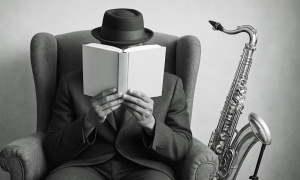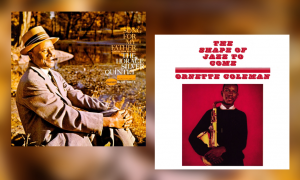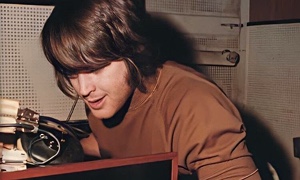Home » Jazz Articles » Building a Jazz Library » ECM Records Touchstones: Part 3
ECM Records Touchstones: Part 3

This third edition of "ECM Touchstones" explores more of the label's early recordings, repackaged and offered up as a way to present music that had perhaps slipped through time's cracks, into the hard-to-find category. Of these, four were re-released in 2019, one in 2008—24 to 47 years after their original releases. The music on these albums is stylistically diverse and uniformly excellent. All of it has stood the test of time.
Here are five more touchstone offerings from the collection, without any method to the madness—just sliding them out of the CD shelf for a fresh listen .
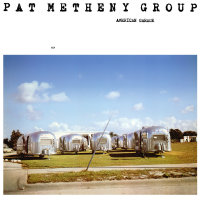 Pat Metheny
Pat MethenyAmerican Garage
1979
This 1979 outing from guitarist Pat Metheny was tagged "jazz-rock" in some quarters. The music did veer away from what some consider ECM Records' contemplative sound. It is cheerful, gregarious music of the most sophisticated sort. The guitarist didn't stay with ECM Records long, after a great beginning on the label with Bright Size Life (1976), New Chautauqua (1979) and 80/81 (1980). On American Garage Metheny, in the company of his all-star quartet—Lyle Mays on keyboards, Mark Egan on bass along with drummer Dan Gottlieb—embraces the template that he has stuck to for more than forty years, making music of the most optimistic and engaging sort, the kind that makes the world a better place.
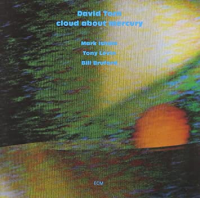 David Torn
David TornCloud About Mercury
1987
Guitarist David Torn started his recording career with ECM Records. Best Laid Plans (1984) was his debut for the label, followed in 1987 with Cloud About Mercury. Though respected as a jazz artist for his own recordings, Torn has also contributed to numerous film scores and a broad array of recordings for musical artists from other genres. Joined on Cloud About Mercury by trumpeter/synthesizer player Mark Isham, bassist Tony Levin and drummer Bill Bruford, Torn sculpts dense sounds that hint at fusion without quite going there, or to any other defined style of music. Compare it to Miles Davis' Bitches Brew (Columbia, 1970), with less intensity, more cheer. A remarkably approachable free jazz album that is in a class of its own.
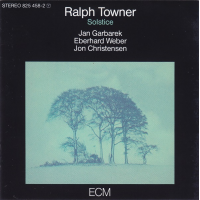 Ralph Towner
Ralph TownerSolstice
1975
Guitarist Ralph Towner's masterpiece, this quartet outing featuring saxophonist Jan Garbarek, bassist Eberhard Weber and drummer Jon Christensen could be picked as the defining album of ECM's pre-new- millennium days. Indeed, if an all-time ECM Records top ten (or twenty or thirty) were to be compiled, this one would be near the top, if not on the top. Though an understated work of art—no flash, no bells or whistles—everything is laid out perfectly, with memorable compositions, uncanny group interplay, and the highest level of musicianship imaginable. It is not music to knock the socks off, but rather a sound experience to be savored and listened to repeatedly.
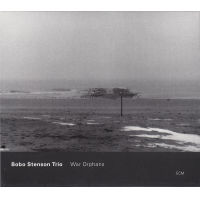 Bobo Stenson Trio
Bobo Stenson TrioWar Orphans
1998
Every album that the Bobo Stenson Trio has recorded has been sublime. Stenson, who does not boast the high profile of Keith Jarrett or Brad Mehldau, should nevertheless be considered one of the top five pianists working today. War Orphans sounds like music found in nature—too naturally beautiful to be made by human hands. Stenson goes as far into the magical world of harmonic depth as Bill Evans did, minus— for the most part—the use of the Great American Songbook to express his ideas. The trio—with Anders Jormin on bass and Jon Christensen doing the drumming—is one of the classics, as distinctive, in its own sweet way, as any piano trio out there
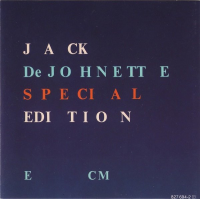 Jack DeJohnette
Jack DeJohnetteSpecial Edition
1975
Drummer/pianist Jack DeJohnette's Special Edition is—for those who ascribe to the notion that ECM Records maintains a continuity of mood—about as un-ECM-like as they get. A rip-roaring, Ornette Coleman-like romp, featuring two free-leaning saxophonists, David Murray and Arthur Blythe. The horn men squabble and shout through spirited saxophone conversations, and DeJohnette and bassist Peter Warren power out rambling, muscular rhythmic undercurrents. Music to shake the sensibilities.
Tags
Building a Jazz Library
Dan McClenaghan
pat metheny
Lyle Mays
Mark Egan
Dan Goelieb
David Torn
Mark Isham
Tony Levin
Bill Bruford
Jan Garbarek
Eberhard Weber
Jon Christensen
Bobo Stenson
Keith Jarrett
Brad Mehdau
Bill Evans
Anders Jorman
Ornette Coleman
Dewey Redman
PREVIOUS / NEXT
Support All About Jazz
 All About Jazz has been a pillar of jazz since 1995, championing it as an art form and, more importantly, supporting the musicians who make it. Our enduring commitment has made "AAJ" one of the most culturally important websites of its kind, read by hundreds of thousands of fans, musicians and industry figures every month.
All About Jazz has been a pillar of jazz since 1995, championing it as an art form and, more importantly, supporting the musicians who make it. Our enduring commitment has made "AAJ" one of the most culturally important websites of its kind, read by hundreds of thousands of fans, musicians and industry figures every month.









